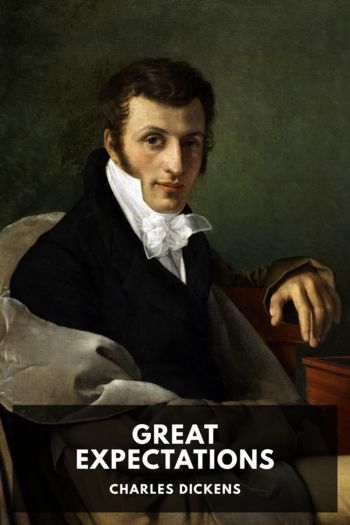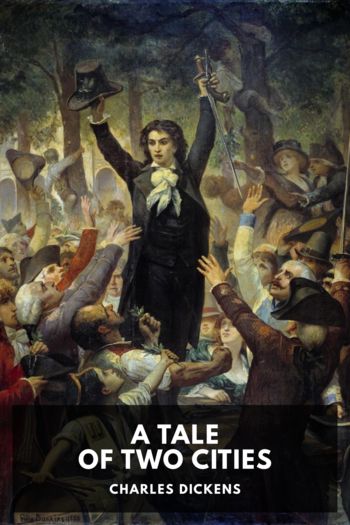Great Expectations by Charles Dickens (e textbook reader .txt) 📕

- Author: Charles Dickens
Book online «Great Expectations by Charles Dickens (e textbook reader .txt) 📕». Author Charles Dickens
The worst of it was that that bullying old Pumblechook, preyed upon by a devouring curiosity to be informed of all I had seen and heard, came gaping over in his chaise-cart at teatime, to have the details divulged to him. And the mere sight of the torment, with his fishy eyes and mouth open, his sandy hair inquisitively on end, and his waistcoat heaving with windy arithmetic, made me vicious in my reticence.
“Well, boy,” Uncle Pumblechook began, as soon as he was seated in the chair of honor by the fire. “How did you get on up town?”
I answered, “Pretty well, sir,” and my sister shook her fist at me.
“Pretty well?” Mr. Pumblechook repeated. “Pretty well is no answer. Tell us what you mean by pretty well, boy?”
Whitewash on the forehead hardens the brain into a state of obstinacy perhaps. Anyhow, with whitewash from the wall on my forehead, my obstinacy was adamantine. I reflected for some time, and then answered as if I had discovered a new idea, “I mean pretty well.”
My sister with an exclamation of impatience was going to fly at me—I had no shadow of defence, for Joe was busy in the forge—when Mr. Pumblechook interposed with “No! Don’t lose your temper. Leave this lad to me, ma’am; leave this lad to me.” Mr. Pumblechook then turned me towards him, as if he were going to cut my hair, and said—
“First (to get our thoughts in order): Forty-three pence?”
I calculated the consequences of replying “Four Hundred Pound,” and finding them against me, went as near the answer as I could—which was somewhere about eightpence off. Mr. Pumblechook then put me through my pence-table from “twelve pence make one shilling,” up to “forty pence make three and fourpence,” and then triumphantly demanded, as if he had done for me, “Now! How much is forty-three pence?” To which I replied, after a long interval of reflection, “I don’t know.” And I was so aggravated that I almost doubt if I did know.
Mr. Pumblechook worked his head like a screw to screw it out of me, and said, “Is forty-three pence seven and sixpence three fardens, for instance?”
“Yes!” said I. And although my sister instantly boxed my ears, it was highly gratifying to me to see that the answer spoilt his joke, and brought him to a dead stop.
“Boy! What like is Miss Havisham?” Mr. Pumblechook began again when he had recovered; folding his arms tight on his chest and applying the screw.
“Very tall and dark,” I told him.
“Is she, uncle?” asked my sister.
Mr. Pumblechook winked assent; from which I at once inferred that he had never seen Miss Havisham, for she was nothing of the kind.
“Good!” said Mr. Pumblechook conceitedly. (“This is the way to have him! We are beginning to hold our own, I think, Mum?”)
“I am sure, uncle,” returned Mrs. Joe, “I wish you had him always; you know so well how to deal with him.”
“Now, boy! What was she a doing of, when you went in today?” asked Mr. Pumblechook.
“She was sitting,” I answered, “in a black velvet coach.”
Mr. Pumblechook and Mrs. Joe stared at one another—as they well might—and both repeated, “In a black velvet coach?”
“Yes,” said I. “And Miss Estella—that’s her niece, I think—handed her in cake and wine at the coach-window, on a gold plate. And we all had cake and wine on gold plates. And I got up behind the coach to eat mine, because she told me to.”
“Was anybody else there?” asked Mr. Pumblechook.
“Four dogs,” said I.
“Large or small?”
“Immense,” said I. “And they fought for veal-cutlets out of a silver basket.”
Mr. Pumblechook and Mrs. Joe stared at one another again, in utter amazement. I was perfectly frantic—a reckless witness under the torture—and would have told them anything.
“Where was this coach, in the name of gracious?” asked my sister.
“In Miss Havisham’s room.” They stared again. “But there weren’t any horses to it.” I added this saving clause, in the moment of rejecting four richly caparisoned coursers which I had had wild thoughts of harnessing.
“Can this be possible, uncle?” asked Mrs. Joe. “What can the boy mean?”
“I’ll tell you, Mum,” said Mr. Pumblechook. “My opinion is, it’s a sedan-chair. She’s flighty, you know—very flighty—quite flighty enough to pass her days in a sedan-chair.”
“Did you ever see her in it, uncle?” asked Mrs. Joe.
“How could I,” he returned, forced to the admission, “when I never see her in my life? Never clapped eyes upon her!”
“Goodness, uncle! And yet you have spoken to her?”
“Why, don’t you know,” said Mr. Pumblechook, testily, “that when I have been there, I have been took up to the outside of her door, and the door has stood ajar, and she has spoke to me that way. Don’t say you don’t know that, Mum. Howsever, the boy went there to play. What did you play at, boy?”
“We played with flags,” I said. (I beg to observe that I think of myself with amazement, when I recall the lies I told on this occasion.)
“Flags!” echoed my sister.
“Yes,” said I. “Estella waved a blue flag, and I waved a red one, and Miss Havisham waved one sprinkled all over with little gold stars, out at the coach-window. And then we all waved our swords and hurrahed.”
“Swords!” repeated my sister. “Where did you get swords from?”
“Out of a cupboard,” said I. “And I saw pistols in it—and jam—and pills. And there was no daylight in the room,





Comments (0)